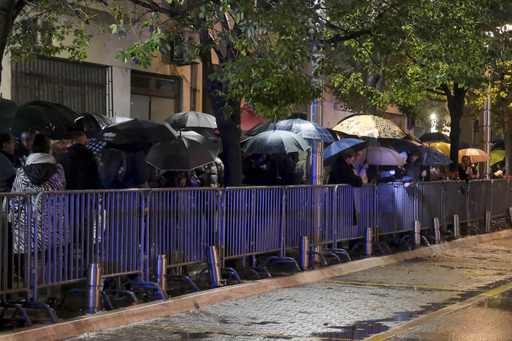PODGORICA, Montenegro — A critical meeting held in Montenegro on Friday focused on implementing stringent measures to address the issue of illegal firearms following a tragic incident where a gunman shot and killed 12 people, marking the second such massacre in less than three years in this small Balkan nation.
An urgent session of the National Security Council led to the announcement of a new, strict gun law aimed at confiscating illegal weapons believed to be in the hands of Montenegro’s 620,000 residents. Prime Minister Milojko Spaji? declared that those with registered firearms will now be subjected to additional security and psychological evaluations. He emphasized that “harsh” penalties are forthcoming for individuals unlawfully possessing weapons.
“There will be no mercy for those who ignore the law,” Spaji? stated during a press conference following the council meeting. “They will face imprisonment.” He further elaborated that a grace period of two months would be allowed for individuals to voluntarily surrender any illegal firearms without legal repercussions. After this period, he warned that penalties imposed by the judiciary will be severe.
Montenegro has a long-standing culture surrounding firearm ownership, with state media reporting that the nation ranks sixth globally for the number of illegal firearms per capita. The individual responsible for the recent shooting, identified as 45-year-old Aco Martinovi?, used an unlicensed 9 mm gun during his violent spree in the western town of Cetinje. Authorities discovered 37 shell casings at various crime scenes, along with over 80 rounds of ammunition in his possession.
Martinovi?, who reportedly acted out of revenge after a bar altercation, ultimately took his own life after committing the mass shooting. His victims included seven men, three women—including his own sister—and two children aged 6 and 12. Additionally, four other individuals sustained severe injuries and are currently hospitalized.
Citing the incident as “one of the biggest tragedies in the history of Montenegro,” Police Commissioner Lazar Š?epanovi? emphasized growing concerns regarding societal violence, exacerbated by the country’s existing political divisions. There are increasing worries regarding the effectiveness of state institutions in controlling issues related to gun ownership.
In memory of the victims, hundreds lit candles in a silent vigil on Thursday, demanding accountability for the tragedy, with many expressing frustration at the government’s inadequate prevention measures. On Friday, approximately 200 individuals gathered outside government buildings in Podgorica, calling for the resignation of senior security officials and chanting slogans condemning the government’s failure.
Mira Škori?, a retiree from Podgorica, lamented, “As a society, we have failed. We have failed as individuals too.” This latest incident recalls a similar massacre in August 2022, where ten individuals, including two children, lost their lives before the assailant was shot by a bystander in Cetinje, the historic capital located roughly 30 kilometers northwest of Podgorica.
Human rights organizations, including Human Rights Action and Women’s Rights Center, released a statement urging a thorough review of the security system’s accountability and its preparedness for such incidents, questioning what improvements have been made since the 2022 shooting.
Despite previous violent offenses and psychiatric treatment, police have indicated that Martinovi?’s violent outburst was spontaneous and difficult to predict or prevent. Vesna Pejovi?, a local who lost her daughter and grandchildren in the previous shooting, criticized law enforcement for failing to act decisively to protect citizens after the first massacre.
“Is this the kind of state where children are killed? Are we at war?” she questioned. “Where was the police?”


